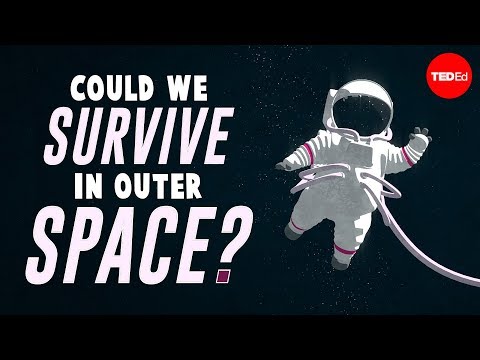(单词翻译:单击)
Prolonged space travel takes a severe toll on the human body.
长时间的太空旅行会对人体造成严重的伤害。
Microgravity impairs muscle and bone growth, and high doses of radiation cause irreversible mutations.
微重力会阻碍肌肉和骨骼的生长,高剂量的辐射会引起不可逆转的变异。
As we seriously consider the human species becoming space-faring, a big question stands.
当人类在宇宙中翱翔变得可行,有一个重要问题值得我们思考。
Even if we break free from Earth's orbit and embark on long-duration journeys among the stars,
即使我们能逃离地球轨道,起航长距离恒星间太空旅程,
can we adapt to the extreme environments of space?
我们能适应宇宙中极端的环境吗?
This won't be the first time that humans have adapted to harsh environments and evolved superhuman capabilities.
这并不会是人类第一次适应艰难的环境,并且因此而进化出“超人”的能力。
Not fantastical powers like laser vision or invisibility, but physiological adaptations for survival in tough conditions.
不是像激光视力或者隐身那样幻想般的超能力,而是在极端条件下生存的生理适应。
For example, on the Himalayan mountains where the highest elevation is nine kilometers above sea level,
例如,在喜马拉雅山上最高高度高于海平面九公里,
an unacclimated lowland human will experience symptoms of hypoxia, commonly known as mountain sickness.
一个不适应高原的低地人会有缺氧症状,也被叫做高原反应或高山症。
At these altitudes, the body usually produces extra red blood cells, thickening the blood and impeding its flow.
在这样的高海拔里,人体通常会制造额外的红血细胞,这会让血液变浓稠,并且会减缓血液循环。
But Himalayans who have lived on these mountains for thousands of years
但是已经住在这些山里上千年的喜马拉雅山人
permanently evolved mechanisms to circumvent this process and maintain normal blood flow.
已经进化出能够规避这个过程并且保持正常血液循环的机制。
Cases like that prove that humans can develop permanent lifesaving traits.
这样的案例证明人类可以进化出永久的、可以救命的特征。
But natural adaptation for entire human populations could take tens of thousands of years.
但是一整个人类种族的自然适应需要成千上万年的时间。
Recent scientific advances may help us accelerate human adaptation to single generations.
近期的科学进展也许可以帮助加速人类适应,把成千上万年减到一代人。
To thrive as a species during space travel,
为了让这个物种在宇宙旅行中茁壮成长,
we could potentially develop methods to quickly program protective abilities into ourselves.
我们有潜能来研究新的方式来快速在我们的身体里规划自我保护技能。
A beta version of these methods is gene therapy, which we can currently use to correct genetic diseases.
基因治疗是这些方式的测试版之一,当前,我们可以通过基因治疗来纠正遗传疾病。
Gene editing technology, which is improving rapidly,
正在高速发展的基因编辑技术,
allows scientists to directly change the human genome to stop undesirable processes or make helpful substances.
让科学家直接改变人类的基因组,以此来停止不尽如人意的过程,或者制造有用的物质。
An example of an unwanted process is what happens when our bodies are exposed to ionizing radiation.
一个不尽如人意的过程的例子是当我们的身体被暴露在电离辐射中。
Without an atmospheric barrier and a magnetic field like Earth's,
没有了地球的大气屏障和磁场,
most planets and moons are bombarded with these dangerous subatomic particles.
大部分的行星和月亮都被这些危险的亚原子粒子包围。
They can pass through nearly anything and would cause potentially cancerous DNA damage to space explorers.
这样的粒子可以穿过几乎所有东西,并且有引起癌变DNA的潜力。
But what if we could turn the tables on radiation?
但是如果我们改变辐射与人体的关系呢?

Human skin produces a pigment called melanin that protects us from the filtered radiation on Earth.
人体的皮肤制造黑色素,黑色素可以在地球上帮助我们免受辐射的伤害。
Melanin exists in many forms across species,
许多其他的物种也有不同种类的黑色素,
and some melanin-expressing fungi use the pigment to convert radiation into chemical energy.
一些带有黑色素的菌类运用黑色素来将辐射转换为化学能量。
Instead of trying to shield the human body, or rapidly repair damage,
与其尝试屏蔽起人类的身体,或者快速的修补损伤,
we could potentially engineer humans to adopt and express these fungal, melanin-based energy-harvesting systems.
我们或许可以改变人类,让人类也可以适应和运用这些和菌类一样的、使用黑色素来收获能量的系统。
They'd then convert radiation into useful energy while protecting our DNA.
这样,人们就可以将辐射转换成可以被利用的能量,并且保护我们的DNA。
This sounds pretty sci-fi, but may actually be achievable with current technology.
这听起来很像科幻小说,却事实上可以被当前的科技实现。
But technology isn't the only obstacle.
但是,科技并不是唯一的阻碍。
There are ongoing debates on the consequences and ethics of such radical alterations to our genetic fabric.
这样对基因改变的后果和伦理都不断被讨论。
Besides radiation, variation in gravitational strength is another challenge for space travelers.
除了辐射,其他重力的变化会对太空旅行者造成挑战。
Until we develop artificial gravity in a space ship or on another planet,
直到我们研究出可以用在宇宙飞船或者另一个星球的人工重力,
we should assume that astronauts will spend time living in microgravity.
我们应该推断宇航员们会一直在微重力的环境里生活。
On Earth, human bone and muscle custodial cells respond to the stress of gravity's incessant tugging
在地球上,人类的骨头、肌肉保管细胞在重力的牵引下,
by renewing old cells in processes known as remodeling and regeneration.
通过重塑和再生来更新久细胞。
But in a microgravity environment like Mars,
但是在一个像火星一样的微重力环境,
human bone and muscle cells won't get these cues, resulting in osteoporosis and muscle atrophy.
人体的骨头和肌肉无法得到这样的信号,也就导致了骨质疏松和肌肉萎缩。
So, how could we provide an artificial signal for cells to counteract bone and muscle loss?
那么,我们要如何制造出给细胞的人造信号来防止骨头和肌肉流失呢?
Again, this is speculative, but biochemically engineered microbes inside our bodies
这也同样是尝试和投机,但是我们身体里通过生物化学产生的微生物
could churn out bone and muscle remodeling signaling factors.
可以引起重塑骨头和肌肉信号的条件。
Or humans could be genetically engineered to produce more of these signals in the absence of gravity.
或者人类可以在基因上被改变,以此在失重的时候制造更多这样的信号。
Radiation exposure and microgravity are only two of the many challenges we will encounter in the hostile conditions of space.
辐射和微重力只是我们会在宇宙中遇到的挑战的其中两个。
But if we're ethically prepared to use them,
但是如果我们在伦理上准备好了来运用它们,
gene editing and microbial engineering are two flexible tools that could be adapted to many scenarios.
基因编辑和微生物工程是两个灵活的工具,它们可以在许多不同的情况下被应用。
In the near future, we may decide to further develop and tune these genetic tools for the harsh realities of space living.
在不久的将来,我们也许会决定去发展这些基因工具让艰难的宇宙生活变得可行。


